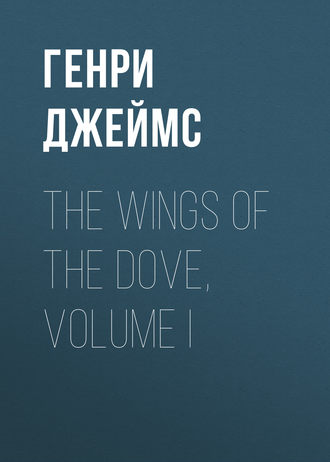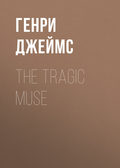
Генри Джеймс
The Wings of the Dove, Volume I
XIV
Milly indeed at last couldn't say; so that she had really for the time brought it along to the point so oddly marked for her by her visitor's arrival, the truth that she was enviably strong. She carried this out, from that evening, for each hour still left her, and the more easily perhaps that the hours were now narrowly numbered. All she actually waited for was Sir Luke Strett's promised visit; as to her proceeding on which, however, her mind was quite made up. Since he wanted to get at Susie he should have the freest access, and then perhaps he would see how he liked it. What was between them they might settle as between them, and any pressure it should lift from her own spirit they were at liberty to convert to their use. If the dear man wished to fire Susan Shepherd with a still higher ideal, he would only after all, at the worst, have Susan on his hands. If devotion, in a word, was what it would come up for the interested pair to organise, she was herself ready to consume it as the dressed and served dish. He had talked to her of her "appetite" her account of which, she felt, must have been vague. But for devotion, she could now see, this appetite would be of the best. Gross, greedy, ravenous—these were doubtless the proper names for her: she was at all events resigned in advance to the machinations of sympathy. The day that followed her lonely excursion was to be the last but two or three of their stay in London; and the evening of that day practically ranked for them as, in the matter of outside relations, the last of all. People were by this time quite scattered, and many of those who had so liberally manifested in calls, in cards, in evident sincerity about visits, later on, over the land, had positively passed in music out of sight; whether as members, these latter, more especially, of Mrs. Lowder's immediate circle or as members of Lord Mark's—our friends being by this time able to make the distinction. The general pitch had thus, decidedly, dropped, and the occasions still to be dealt with were special and few. One of these, for Milly, announced itself as the doctor's call already mentioned, as to which she had now had a note from him: the single other, of importance, was their appointed leave-taking—for the shortest separation—in respect to Mrs. Lowder and Kate. The aunt and the niece were to dine with them alone, intimately and easily—as easily as should be consistent with the question of their afterwards going on together to some absurdly belated party, at which they had had it from Aunt Maud that they would do well to show. Sir Luke was to make his appearance on the morrow of this, and in respect to that complication Milly had already her plan.
The night was, at all events, hot and stale, and it was late enough by the time the four ladies had been gathered in, for their small session, at the hotel, where the windows were still open to the high balconies and the flames of the candles, behind the pink shades—disposed as for the vigil of watchers—were motionless in the air in which the season lay dead. What was presently settled among them was that Milly, who betrayed on this occasion a preference more marked than usual, should not hold herself obliged to climb that evening the social stair, however it might stretch to meet her, and that, Mrs. Lowder and Mrs. Stringham facing the ordeal together, Kate Croy should remain with her and await their return. It was a pleasure to Milly, ever, to send Susan Shepherd forth; she saw her go with complacency, liked, as it were, to put people off with her, and noted with satisfaction, when she so moved to the carriage, the further denudation—a markedly ebbing tide—of her little benevolent back. If it wasn't quite Aunt Maud's ideal, moreover, to take out the new American girl's funny friend instead of the new American girl herself, nothing could better indicate the range of that lady's merit than the spirit in which—as at the present hour for instance—she made the best of the minor advantage. And she did this with a broad, cheerful absence of illusion; she did it—confessing even as much to poor Susie—because, frankly, she was good-natured. When Mrs. Stringham observed that her own light was too abjectly borrowed and that it was as a link alone, fortunately not missing, that she was valued, Aunt Maud concurred to the extent of the remark: "Well, my dear, you're better than nothing." To-night, furthermore, it came up for Milly that Aunt Maud had something particular in mind. Mrs. Stringham, before adjourning with her, had gone off for some shawl or other accessory, and Kate, as if a little impatient for their withdrawal, had wandered out to the balcony, where she hovered, for the time, unseen, though with scarce more to look at than the dim London stars and the cruder glow, up the street, on a corner, of a small public-house, in front of which a fagged cab-horse was thrown into relief. Mrs. Lowder made use of the moment: Milly felt as soon as she had spoken that what she was doing was somehow for use.
"Dear Susan tells me that you saw, in America, Mr. Densher—whom I've never till now, as you may have noticed, asked you about. But do you mind at last, in connection with him, doing something for me?" She had lowered her fine voice to a depth, though speaking with all her rich glibness; and Milly, after a small sharpness of surprise, was already guessing the sense of her appeal. "Will you name him, in any way you like, to her"—and Aunt Maud gave a nod at the window; "so that you may perhaps find out whether he's back?"
Ever so many things, for Milly, fell into line at this; it was a wonder, she afterwards thought, that she could be conscious of so many at once. She smiled hard, however, for them all. "But I don't know that it's important to me to 'find out.'" The array of things was further swollen, however, even as she said this, by its striking her as too much to say. She therefore tried as quickly to say less. "Except you mean, of course, that it's important to you." She fancied Aunt Maud was looking at her almost as hard as she was herself smiling, and that gave her another impulse. "You know I never have yet named him to her; so that if I should break out now–"
"Well?"—Mrs. Lowder waited.
"Why, she may wonder what I've been making a mystery of. She hasn't mentioned him, you know," Milly went on, "herself."
"No"—her friend a little heavily weighed it—"she wouldn't. So it's she, you see then, who has made the mystery."
Yes, Milly but wanted to see; only there was so much. "There has been of course no particular reason." Yet that indeed was neither here nor there. "Do you think," she asked, "he is back?"
"It will be about his time, I gather, and rather a comfort to me definitely to know."
"Then can't you ask her yourself?"
"Ah, we never speak of him!"
It helped Milly for the moment to the convenience of a puzzled pause. "Do you mean he's an acquaintance of whom you disapprove for her?"
Aunt Maud, as well, just hung fire. "I disapprove of her for the poor young man. She doesn't care for him."
"And he cares so much–?"
"Too much, too much. And my fear is," said Mrs. Lowder, "that he privately besets her. She keeps it to herself, but I don't want her worried. Neither, in truth," she both generously and confidentially concluded, "do I want him."
Milly showed all her own effort to meet the case. "But what can I do?"
"You can find out where they are. If I myself try," Mrs. Lowder explained, "I shall appear to treat them as if I supposed them deceiving me."
"And you don't. You don't," Milly mused for her, "suppose them deceiving you."
"Well," said Aunt Maud, whose fine onyx eyes failed to blink, even though Milly's questions might have been taken as drawing her rather further than she had originally meant to go—"well, Kate is thoroughly aware of my views for her, and that I take her being with me, at present, in the way she is with me, if you know what I mean, as a loyal assent to them. Therefore as my views don't happen to provide a place, at all, for Mr. Densher, much, in a manner, as I like him"—therefore, therefore in short she had been prompted to this step, though she completed her sense, but sketchily, with the rattle of her large fan.
It assisted them perhaps, however, for the moment, that Milly was able to pick out of her sense what might serve as the clearest part of it. "You do like him then?"
"Oh dear, yes. Don't you?"
Milly hesitated, for the question was somehow as the sudden point of something sharp on a nerve that winced. She just caught her breath, but she had ground for joy afterwards, she felt, in not really having failed to choose with quickness sufficient, out of fifteen possible answers, the one that would best serve her. She was then almost proud, as well, that she had cheerfully smiled. "I did—three times—in New York." So came and went for her, in these simple words, the speech that was to figure for her, later on, that night, as the one she had ever uttered that cost her most. She was to lie awake, at all events, half the night, for the gladness of not having taken any line so really inferior as the denial of a happy impression.
For Mrs. Lowder also, moreover, her simple words were the right ones; they were at any rate, that lady's laugh showed, in the natural note of the racy. "You dear American thing! But people may be very good, and yet not good for what one wants."
"Yes," the girl assented, "even I suppose when what one wants is something very good."
"Oh, my child, it would take too long just now to tell you all I want! I want everything at once and together—and ever so much for you too, you know. But you've seen us," Aunt Maud continued; "you'll have made out."
"Ah," said Milly, "I don't make out"; for again—it came that way in rushes—she felt an obscurity in things. "Why, if our friend here doesn't like him–"
"Should I conceive her interested in keeping things from me?" Mrs. Lowder did justice to the question. "My dear, how can you ask? Put yourself in her place. She meets me, but on her terms. Proud young women are proud young women. And proud old ones are—well, what I am. Fond of you as we both are, you can help us."
Milly tried to be inspired. "Does it come back then to my asking her straight?"
At this, however, finally, Aunt Maud threw her up. "Oh, if you've so many reasons not–!"
"I've not so many," Milly smiled "but I've one. If I break out so suddenly as knowing him, what will she make of my not having spoken before?"
Mrs. Lowder looked blank at it. "Why should you care what she makes? You may have only been decently discreet."
"Ah, I have been," the girl made haste to say.
"Besides," her friend went on, "I suggested to you, through Susan, your line."
"Yes, that reason's a reason for me."
"And for me," Mrs. Lowder insisted. "She's not therefore so stupid as not to do justice to grounds so marked. You can tell her perfectly that I had asked you to say nothing."
"And may I tell her that you've asked me now to speak?"
Mrs. Lowder might well have thought, yet, oddly, this pulled her up. "You can't do it without–?"
Milly was almost ashamed to be raising so many difficulties. "I'll do what I can if you'll kindly tell me one thing more." She faltered a little—it was so prying; but she brought it out. "Will he have been writing to her?"
"It's exactly, my dear, what I should like to know." Mrs. Lowder was at last impatient. "Push in for yourself, and I dare say she'll tell you."
Even now, all the same, Milly had not quite fallen back. "It will be pushing in," she continued to smile, "for you" She allowed her companion, however, no time to take this up. "The point will be that if he has been writing she may have answered."
"But what point, you subtle thing, is that?"
"It isn't subtle, it seems to me, but quite simple," Milly said, "that if she has answered she has very possibly spoken of me."
"Very certainly indeed. But what difference will it make?"
The girl had a moment, at this, of thinking it natural that her interlocutress herself should so fail of subtlety. "It will make the difference that he will have written to her in answer that he knows me. And that, in turn," our young woman explained, "will give an oddity to my own silence."
"How so, if she's perfectly aware of having given you no opening? The only oddity," Aunt Maud lucidly professed, "is for yourself. It's in her not having spoken."
"Ah, there we are!" said Milly.
And she had uttered it, evidently, in a tone that struck her friend. "Then it has troubled you?"
But ah, the inquiry had only to be made to bring the rare colour with fine inconsequence, to her face. "Not, really, the least little bit!" And, quickly feeling the need to abound in this sense, she was on the point, to cut short, of declaring that she cared, after all, no scrap how much she obliged. Only she felt at this instant too the intervention of still other things. Mrs. Lowder was, in the first place, already beforehand, already affected as by the sudden vision of her having herself pushed too far. Milly could never judge from her face of her uppermost motive—it was so little, in its hard, smooth sheen, that kind of human countenance. She looked hard when she spoke fair; the only thing was that when she spoke hard she likewise didn't look soft. Something, none the less, had arisen in her now—a full appreciable tide, entering by the rupture of some bar. She announced that if what she had asked was to prove in the least a bore her young friend was not to dream of it; making her young friend at the same time, by the change in her tone, dream on the spot more profusely. She spoke with a belated light, Milly could apprehend—she could always apprehend—from pity; and the result of that perception, for the girl, was singular: it proved to her as quickly that Kate, keeping her secret, had been straight with her. From Kate distinctly then, as to why she was to be pitied, Aunt Maud knew nothing, and was thereby simply putting in evidence the fine side of her own character. This fine side was that she could almost at any hour, by a kindled preference or a diverted energy, glow for another interest than her own. She exclaimed as well, at this moment, that Milly must have been thinking, round the case, much more than she had supposed; and this remark could, at once, affect the girl as sharply as any other form of the charge of weakness. It was what everyone, if she didn't look out, would soon be saying—"There's something the matter with you!" What one was therefore one's self concerned immediately to establish was that there was nothing at all. "I shall like to help you; I shall like, so far as that goes, to help Kate herself," she made such haste as she could to declare; her eyes wandering meanwhile across the width of the room to that dusk of the balcony in which their companion perhaps a little unaccountably lingered. She suggested hereby her impatience to begin; she almost overtly wondered at the length of the opportunity this friend was giving them—referring it, however, so far as words went, to the other friend, breaking off with an amused: "How tremendously Susie must be beautifying!"
It only marked Aunt Maud, none the less, as too preoccupied for her allusion. The onyx eyes were fixed upon her with a polished pressure that must signify some enriched benevolence. "Let it go, my dear. We shall, after all, soon enough see."
"If he has come back we shall certainly see," Milly after a moment replied; "for he'll probably feel that he can't quite civilly not come to see me. Then there," she remarked, "we shall be. It wouldn't then, you see, come through Kate at all—it would come through him. Except," she wound up with a smile, "that he won't find me."
She had the most extraordinary sense of interesting her interlocutress, in spite of herself, more than she wanted; it was as if her doom so floated her on that she couldn't stop—by very much the same trick it had played her with her doctor. "Shall you run away from him?"
She neglected the question, wanting only now to get off. "Then," she went on, "you'll deal with Kate directly."
"Shall you run away from her?" Mrs. Lowder profoundly inquired, while they became aware of Susie's return through the room, opening out behind them, in which they had dined.
This affected Milly as giving her but an instant; and suddenly, with it, everything she felt in the connection rose to her lips in a question that, even as she put it, she knew she was failing to keep colourless. "Is it your own belief that he is with her?"
Aunt Maud took it in—took in, that is, everything of the tone that she just wanted her not to; and the result for some seconds, was but to make their eyes meet in silence. Mrs. Stringham had rejoined them and was asking if Kate had gone—an inquiry at once answered by this young lady's reappearance. They saw her again in the open window, where, looking at them, she had paused—producing thus, on Aunt Maud's part, almost too impressive a "Hush!" Mrs. Lowder indeed, without loss of time, smothered any danger in a sweeping retreat with Susie; but Milly's words to her, just uttered, about dealing with her niece directly, struck our young woman as already recoiling on herself. Directness, however evaded, would be, fully, for her; nothing in fact would ever have been for her so direct as the evasion. Kate had remained in the window, very handsome and upright, the outer dark framing in a highly favourable way her summery simplicities and lightnesses of dress. Milly had, given the relation of space, no real fear she had heard their talk; only she hovered there as with conscious eyes and some added advantage. Then indeed, with small delay, her friend sufficiently saw. The conscious eyes, the added advantage were but those she had now always at command—those proper to the person Milly knew as known to Merton Densher. It was for several seconds again as if the total of her identity had been that of the person known to him—a determination having for result another sharpness of its own. Kate had positively but to be there just as she was to tell her he had come back. It seemed to pass between them, in fine, without a word, that he was in London, that he was perhaps only round the corner; and surely therefore no dealing of Milly's with her would yet have been so direct.
XV
It was doubtless because this queer form of directness had in itself, for the hour, seemed so sufficient that Milly was afterwards aware of having really, all the while—during the strange, indescribable session before the return of their companions—done nothing to intensify it. If she was most aware only afterwards, under the long, discurtained ordeal of the morrow's dawn, that was because she had really, till their evening's end came, ceased, after a little, to miss anything from their ostensible comfort. What was behind showed but in gleams and glimpses; what was in front never at all confessed to not holding the stage. Three minutes had not passed before Milly quite knew she should have done nothing Aunt Maud had just asked her. She knew it moreover by much the same light that had acted for her with that lady and with Sir Luke Strett. It pressed upon her then and there that she was still in a current determined, through her indifference, timidity, bravery, generosity—she scarce could say which—by others; that not she but the current acted, and that somebody else, always, was the keeper of the lock or the dam. Kate for example had but to open the flood-gate: the current moved in its mass—the current, as it had been, of her doing as Kate wanted. What, somehow, in the most extraordinary way in the world, had Kate wanted but to be, of a sudden, more interesting than she had ever been? Milly, for their evening then, quite held her breath with the appreciation of it. If she hadn't been sure her companion would have had nothing, from her moments with Mrs. Lowder, to go by, she would almost have seen the admirable creature "cutting in" to anticipate a danger. This fantasy indeed, while they sat together, dropped after a little; even if only because other fantasies multiplied and clustered, making fairly, for our young woman, the buoyant medium in which her friend talked and moved. They sat together, I say, but Kate moved as much as she talked; she figured there, restless and charming, just perhaps a shade perfunctory, repeatedly quitting her place, taking slowly, to and fro, in the trailing folds of her light dress, the length of the room, and almost avowedly performing for the pleasure of her hostess.
Mrs. Lowder had said to Milly at Matcham that she and her niece, as allies, could practically conquer the world; but though it was a speech about which there had even then been a vague, grand glamour, the girl read into it at present more of an approach to a meaning. Kate, for that matter, by herself, could conquer anything, and she, Milly Theale, was probably concerned with the "world" only as the small scrap of it that most impinged on her and that was therefore first to be dealt with. On this basis of being dealt with she would doubtless herself do her share of the conquering: she would have something to supply, Kate something to take—each of them thus, to that tune, something for squaring with Aunt Maud's ideal. This in short was what it came to now—that the occasion, in the quiet late lamplight, had the quality of a rough rehearsal of the possible big drama. Milly knew herself dealt with—handsomely, completely: she surrendered to the knowledge, for so it was, she felt, that she supplied her helpful force. And what Kate had to take Kate took as freely and, to all appearance, as gratefully; accepting afresh, with each of her long, slow walks, the relation between them so established and consecrating her companion's surrender simply by the interest she gave it. The interest to Milly herself we naturally mean; the interest to Kate Milly felt as probably inferior. It easily and largely came for their present talk, for the quick flight of the hour before the breach of the spell—it all came, when considered, from the circumstance, not in the least abnormal, that the handsome girl was in extraordinary "form." Milly remembered her having said that she was at her best late at night; remembered it by its having, with its fine assurance, made her wonder when she was at her best and how happy people must be who had such a fixed time. She had no time at all; she was never at her best—unless indeed it were exactly, as now, in listening, watching, admiring, collapsing. If Kate moreover, quite mercilessly, had never been so good, the beauty and the marvel of it was that she had never really been so frank; being a person of such a calibre, as Milly would have said, that, even while "dealing" with you and thereby, as it were, picking her steps, she could let herself go, could, in irony, in confidence, in extravagance, tell you things she had never told before. That was the impression—that she was telling things, and quite conceivably for her own relief as well; almost as if the errors of vision, the mistakes of proportion, the residuary innocence of spirit still to be remedied on the part of her auditor had their moments of proving too much for her nerves. She went at them just now, these sources of irritation, with an amused energy that it would have been open to Milly to regard as cynical and that was nevertheless called for—as to this the other was distinct—by the way that in certain connections the American mind broke down. It seemed at least—the American mind as sitting there thrilled and dazzled in Milly—not to understand English society without a separate confrontation with all the cases. It couldn't proceed by—there was some technical term she lacked until Milly suggested both analogy and induction, and then, differently, instinct, none of which were right: it had to be led up and introduced to each aspect of the monster, enabled to walk all round it, whether for the consequent exaggerated ecstasy or for the still more as appeared to this critic disproportionate shock. It might, the monster, Kate conceded, loom large for those born amid forms less developed and therefore no doubt less amusing; it might on some sides be a strange and dreadful monster, calculated to devour the unwary, to abase the proud, to scandalize the good; but if one had to live with it one must, not to be for ever sitting up, learn how: which was virtually in short to-night what the handsome girl showed herself as teaching.
She gave away publicly, in this process, Lancaster Gate and everything it contained; she gave away, hand over hand, Milly's thrill continued to note, Aunt Maud and Aunt Maud's glories and Aunt Maud's complacencies; she gave herself away most of all, and it was naturally what most contributed to her candour. She didn't speak to her friend once more, in Aunt Maud's strain, of how they could scale the skies; she spoke, by her bright, perverse preference on this occasion, of the need, in the first place, of being neither stupid nor vulgar. It might have been a lesson, for our young American, in the art of seeing things as they were—a lesson so various and so sustained that the pupil had, as we have shown, but receptively to gape. The odd thing furthermore was that it could serve its purpose while explicitly disavowing every personal bias. It wasn't that she disliked Aunt Maud, who was everything she had on other occasions declared; but the dear woman, ineffaceably stamped by inscrutable nature and a dreadful art, wasn't—how could she be?—what she wasn't. She wasn't any one. She wasn't anything. She wasn't anywhere. Milly mustn't think it—one couldn't, as a good friend, let her. Those hours at Matcham were inespérées, were pure manna from heaven; or if not wholly that perhaps, with humbugging old Lord Mark as a backer, were vain as a ground for hopes and calculations. Lord Mark was very well, but he wasn't the cleverest creature in England, and even if he had been he still wouldn't have been the most obliging. He weighed it out in ounces, and indeed each of the pair was really waiting for what the other would put down.
"She has put down you." said Milly, attached to the subject still; "and I think what you mean is that, on the counter, she still keeps hold of you."
"Lest"—Kate took it up—"he should suddenly grab me and run? Oh, as he isn't ready to run, he's much less ready, naturally, to grab. I am—you're so far right as that—on the counter, when I'm not in the shop-window; in and out of which I'm thus conveniently, commercially whisked: the essence, all of it, of my position, and the price, as properly, of my aunt's protection." Lord Mark was substantially what she had begun with as soon as they were alone; the impression was even yet with Milly of her having sounded his name, having imposed it, as a topic, in direct opposition to the other name that Mrs. Lowder had left in the air and that all her own look, as we have seen, kept there at first for her companion. The immediate strange effect had been that of her consciously needing, as it were, an alibi—which, successfully, she so found. She had worked it to the end, ridden it to and fro across the course marked for Milly by Aunt Maud, and now she had quite, so to speak, broken it in. "The bore is that if she wants him so much—wants him, heaven forgive her! for me—he has put us all out, since your arrival, by wanting somebody else. I don't mean somebody else than you."
Milly threw off the charm sufficiently to shake her head. "Then I haven't made out who it is. If I'm any part of his alternative he had better stop where he is."
"Truly, truly?—always, always?"
Milly tried to insist with an equal gaiety. "Would you like me to swear?"
Kate appeared for a moment—though that was doubtless but gaiety too—to think. "Haven't we been swearing enough?"
"You have perhaps, but I haven't, and I ought to give you the equivalent. At any rate there it is. Truly, truly as you say—'always, always.' So I'm not in the way."
"Thanks," said Kate—"but that doesn't help me."
"Oh, it's as simplifying for him that I speak of it."
"The difficulty really is that he's a person with so many ideas that it's particularly hard to simplify for him. That's exactly of course what Aunt Maud has been trying. He won't," Kate firmly continued, "make up his mind about me."
"Well," Milly smiled, "give him time."
Her friend met it in perfection. "One is doing that—one is. But one remains, all the same, but one of his ideas."
"There's no harm in that," Milly returned, "if you come out in the end as the best of them. What's a man," she pursued, "especially an ambitious one, without a variety of ideas?"
"No doubt. The more the merrier." And Kate looked at her grandly. "One can but hope to come out, and do nothing to prevent it."
All of which made for the impression, fantastic or not, of the alibi. The splendour, the grandeur were, for Milly, the bold ironic spirit behind it, so interesting too in itself. What, moreover, was not less interesting was the fact, as our young woman noted it, that Kate confined her point to the difficulties, so far as she was concerned, raised only by Lord Mark. She referred now to none that her own taste might present; which circumstance again played its little part. She was doing what she liked in respect to another person, but she was in no way committed to the other person, and her furthermore talking of Lord Mark as not young and not true were only the signs of her clear self-consciousness, were all in the line of her slightly hard, but scarce the less graceful extravagance. She didn't wish to show too much her consent to be arranged for, but that was a different thing from not wishing sufficiently to give it. There was something moreover, on it all, that Milly still found occasion to say, "If your aunt has been, as you tell me, put out by me, I feel that she has remained remarkably kind."
"Oh, but she has—whatever might have happened in that respect—plenty of use for you! You put her in, my dear, more than you put her out. You don't half see it, but she has clutched your petticoat. You can do anything—you can do, I mean, lots that we can't. You're an outsider, independent and standing by yourself; you're not hideously relative to tiers and tiers of others." And Kate, facing in that direction, went further and further; wound up, while Milly gaped, with extraordinary words. "We're of no use to you—it's decent to tell you. You'd be of use to us, but that's a different matter. My honest advice to you would be—" she went indeed all lengths—"to drop us while you can. It would be funny if you didn't soon see how awfully better you can do. We've not really done for you the least thing worth speaking of—nothing you mightn't easily have had in some other way. Therefore you're under no obligation. You won't want us next year; we shall only continue to want you. But that's no reason for you, and you mustn't pay too dreadfully for poor Mrs. Stringham's having let you in. She has the best conscience in the world; she's enchanted with what she has done; but you shouldn't take your people from her. It has been quite awful to see you do it."







